精华整理:写精彩影评和书评攻略
怎样写影评及经典影评范文
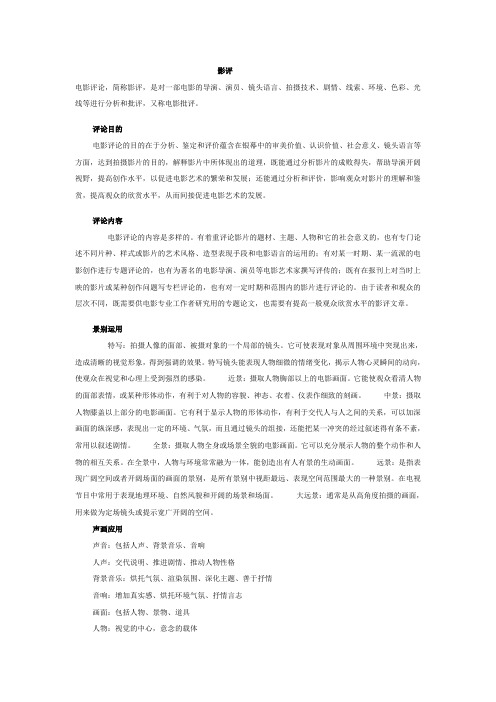
影评电影评论,简称影评,是对一部电影的导演、演员、镜头语言、拍摄技术、剧情、线索、环境、色彩、光线等进行分析和批评,又称电影批评。
评论目的电影评论的目的在于分析、鉴定和评价蕴含在银幕中的审美价值、认识价值、社会意义、镜头语言等方面,达到拍摄影片的目的,解释影片中所体现出的道理,既能通过分析影片的成败得失,帮助导演开阔视野,提高创作水平,以促进电影艺术的繁荣和发展;还能通过分析和评价,影响观众对影片的理解和鉴赏,提高观众的欣赏水平,从而间接促进电影艺术的发展。
评论内容电影评论的内容是多样的。
有着重评论影片的题材、主题、人物和它的社会意义的,也有专门论述不同片种、样式或影片的艺术风格、造型表现手段和电影语言的运用的;有对某一时期、某一流派的电影创作进行专题评论的,也有为著名的电影导演、演员等电影艺术家撰写评传的;既有在报刊上对当时上映的影片或某种创作问题写专栏评论的,也有对一定时期和范围内的影片进行评论的。
由于读者和观众的层次不同,既需要供电影专业工作者研究用的专题论文,也需要有提高一般观众欣赏水平的影评文章。
景别运用特写:拍摄人像的面部、被摄对象的一个局部的镜头。
它可使表现对象从周围环境中突现出来,造成清晰的视觉形象,得到强调的效果。
特写镜头能表现人物细微的情绪变化,揭示人物心灵瞬间的动向,使观众在视觉和心理上受到强烈的感染。
近景:摄取人物胸部以上的电影画面。
它能使观众看清人物的面部表情,或某种形体动作,有利于对人物的容貌、神态、衣着、仪表作细致的刻画。
中景:摄取人物膝盖以上部分的电影画面。
它有利于显示人物的形体动作,有利于交代人与人之间的关系,可以加深画面的纵深感,表现出一定的环境、气氛,而且通过镜头的组接,还能把某一冲突的经过叙述得有条不紊,常用以叙述剧情。
全景:摄取人物全身或场景全貌的电影画面。
它可以充分展示人物的整个动作和人物的相互关系。
在全景中,人物与环境常常融为一体,能创造出有人有景的生动画面。
如何写好影评

如何写好影评写影评,应该把握好这样几点:捕捉住感受点。
一部电影涉及的方面很广,需要品评的着笔点很多。
这就需要对电影反复回味思考,用心灵再度感受,把握往影片中最能动人的地方,并使之在自己的笔下得到理性的升华。
立意要新,开掘要深。
写影评要有新意,要有独到的见解,抓往要点,自感而发。
要做到有新意,一是要抓住影片内容,结合台社会现买;二是要准确把握住影片的精神实质,挖掘影片本身所包含的深刻内涵。
例如对张艺谋电影的分析要紧扣住时代背景,但也不必要都从思想意义角度分析,如巩俐在张艺谋电影中的形象塑造,张艺谋电影中的男性形象等,都是可以开掘的领域。
影评写作可以有长有短,可着眼于一部影片的一个镜头,也可以着眼于一种电影现象。
对于我们师范生来说,要对一部影片作出全面的评价比较困难,练习写影评,可从评论一个人物形象、一个情节、一个场面入手,可对演员演技。
拍摄技巧、导演意图、影片风格、色彩、语言、音乐等进行单一的评析。
随着写影评水平的提高,就可对某一人物形象,如影片中的学生、教师、军人等银幕形象发表看法,也可以从纵向谈某一阶段电影的回顾或某一体裁电影的回顾,分析其得失;或从横向谈某一风格的电影,如西部电影、贺岁片、娱乐片等,或横纵向结合,谈一个导演的风格,如谢晋模式、张艺谋现象等到。
初涉影评写作不宜贪大求全,而应从一点一滴写起,思考挖掘,连缀成篇。
开始练习写作影评时还应该注意:语言要朴实,要个性化。
写影评一定要讲真话,讲自己的话,不要抄袭别人的评论。
唯独自己的感受和朴实的语言,才会使自己的评论富有个性和新意,也才会给读者带来清新的感受。
叙议要结合,突出评论。
电影最直观可感的,影评离不开叙事。
但切忌过多地叙述故事,要突出分析写评价。
当然,所评所析不得脱离影片孤立地进行。
我们在写影评的过程中,要不断总结学习他人的写作经验,丰富自己的写作实践,在日积月累的基础上,通过影评的写作,不断促进我们知识结何的完善,提高我们的颀赏水平和审美能力。
如何写好影评

如何写好影评如何写好影评影评是对电影作品的评价和分析,是一种文学形式的表达。
一篇好的影评能够准确地概括电影的主题、刻画角色形象,同时也要有自己独特的见解和观点,可以引发读者的思考和讨论。
下面将从准备工作、电影分析、撰写影评等方面介绍如何写好影评。
一、准备工作在撰写影评之前,我们需要对所要评论的电影进行充分的准备工作。
首先,观看电影本身是基础,我们要尽可能多地去了解电影的内容、主题、故事情节、背景等。
其次,了解电影的背景信息也是必要的,例如导演、编剧、演员阵容等。
这些准备工作能够帮助我们更全面地理解电影,并为后面的分析提供所需的素材。
二、电影分析1.主题分析:首先,我们需要概括电影的主题是什么。
主题是电影所要表达的核心思想和情感,而不仅仅是故事情节的简单陈述。
我们可以从电影的情节、对话、角色等多个方面去揣摩电影的主题是什么。
例如,一部关于友谊的电影,主题可能是友谊的力量和意义。
2.角色分析:电影的角色是故事的核心,我们可以从角色的塑造、人物性格和性格转变等方面去分析角色。
我们需要关注角色的扮演者是如何演绎角色的,以及角色的情感和动机是怎样的。
通过角色分析,我们能够更好地理解电影的内涵。
3.情节分析:情节是电影的骨架,我们需要关注电影的故事发展和转折点。
通过对情节的分析,我们可以了解电影的起伏和高潮,以及故事的发展逻辑是否紧密。
4.摄影和音乐分析:除了剧情和角色,电影的视觉和声音效果也是不可忽视的。
我们可以对电影的镜头运用、色调和编辑手法进行评价,以及音乐和配乐对电影的表现力的影响。
三、撰写影评在撰写影评之前,我们需要总结自己的观点和观察,并提炼出几个核心观点。
这些观点可以是对电影整体的评价,或者是对电影的细节进行点评。
在撰写影评时,我们需要充分发挥自己的创造力和独立思考。
以下是撰写影评的一些建议和技巧:1.引言:影评的开篇要有一个引人注意的开场白,可以是对电影的一个概括性评价或引用一句有代表性的台词。
影评写作技巧
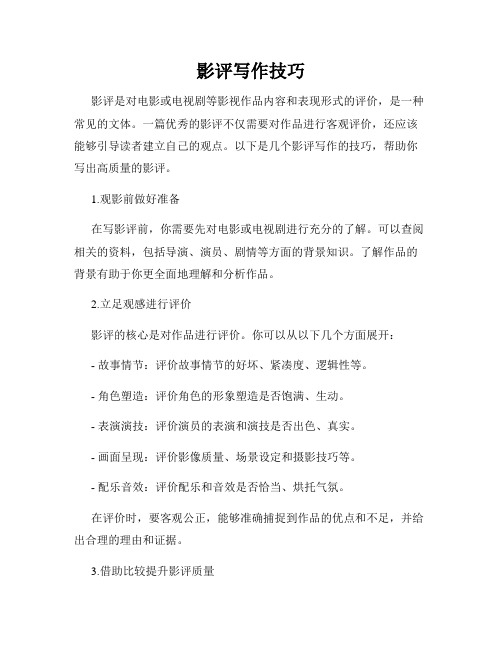
影评写作技巧影评是对电影或电视剧等影视作品内容和表现形式的评价,是一种常见的文体。
一篇优秀的影评不仅需要对作品进行客观评价,还应该能够引导读者建立自己的观点。
以下是几个影评写作的技巧,帮助你写出高质量的影评。
1.观影前做好准备在写影评前,你需要先对电影或电视剧进行充分的了解。
可以查阅相关的资料,包括导演、演员、剧情等方面的背景知识。
了解作品的背景有助于你更全面地理解和分析作品。
2.立足观感进行评价影评的核心是对作品进行评价。
你可以从以下几个方面展开:- 故事情节:评价故事情节的好坏、紧凑度、逻辑性等。
- 角色塑造:评价角色的形象塑造是否饱满、生动。
- 表演演技:评价演员的表演和演技是否出色、真实。
- 画面呈现:评价影像质量、场景设定和摄影技巧等。
- 配乐音效:评价配乐和音效是否恰当、烘托气氛。
在评价时,要客观公正,能够准确捕捉到作品的优点和不足,并给出合理的理由和证据。
3.借助比较提升影评质量作为影评写作的一种常用手法,比较能够帮助读者更好地理解你的观点。
你可以与其他同类型或相似主题的影视作品进行比较,指出它们之间的共同点和差异性,从而更准确地评价本片的特点。
4.注重细节和情感的描写在写影评时,不仅要关注故事情节、表演和制作等方面,还要注重对细节和情感的描写。
通过详细描述某个镜头的构图、演员的表情、音乐的变化等,能够更生动地表现作品的魅力,同时也能引发读者的情感共鸣。
5.交代你的观点和立场在影评的结尾,你可以总结自己的观点,并表达对作品的评价。
你可以给作品打分、评选某个方面的最佳或明确表达你是否推荐该作品等。
此外,你也要对你的观点提供充分的理由和证据,有助于读者理解你的立场。
6.语言准确简练影评需要使用准确、简练的语言进行表达,避免使用模糊、含糊不清的词语和句子。
同时,也要避免使用过于专业化的术语,以便广大读者更好地理解你的观点。
7.注意结构和篇章连贯性影评需要有清晰的结构和连贯的篇章,以帮助读者更好地理解你的观点。
如何写一篇好的影评

如何写一篇好的影评
可以按照如下结构来写一篇好的影评
标题:《[电影名称]》影评
一、引言
简要介绍电影的名称、类型、导演等基本信息。
说明为什么选择这部电影进行评论。
二、剧情简介
简要描述电影的故事情节,包括主要人物、情节发展等。
强调电影的独特之处或引人入胜之处。
三、人物分析
分析电影中的主要人物,包括他们的性格、行为和对电影的影响。
讨论人物塑造的成功之处和不足之处。
四、视觉效果
评价电影的视觉效果,包括画面、色彩、音乐等方面。
讨论电影在视觉上的创新之处和不足之处。
五、主题和寓意
探讨电影的主题和寓意,以及它们对观众的启示。
解释电影如何引发观众的思考和情感共鸣。
六、评价和推荐
对电影进行综合评价,并说明是否推荐给其他人观看。
强调电影的独特之处和值得观看的理由。
七、结论
总结电影的优点和不足,以及对电影的总体评价。
对电影未来的发展提出建议或期待。
在写电影影评时,需要注意语言的流畅性和准确性,同时要避免剧透。
此外,还可以结合自己的观影体验,提出自己的观点和看法。
怎样写书评影评类作文
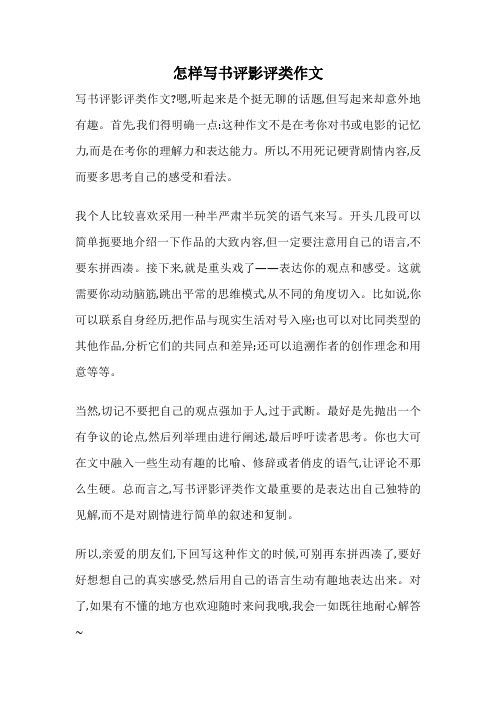
怎样写书评影评类作文
写书评影评类作文?嗯,听起来是个挺无聊的话题,但写起来却意外地有趣。
首先,我们得明确一点:这种作文不是在考你对书或电影的记忆力,而是在考你的理解力和表达能力。
所以,不用死记硬背剧情内容,反而要多思考自己的感受和看法。
我个人比较喜欢采用一种半严肃半玩笑的语气来写。
开头几段可以简单扼要地介绍一下作品的大致内容,但一定要注意用自己的语言,不要东拼西凑。
接下来,就是重头戏了——表达你的观点和感受。
这就需要你动动脑筋,跳出平常的思维模式,从不同的角度切入。
比如说,你可以联系自身经历,把作品与现实生活对号入座;也可以对比同类型的其他作品,分析它们的共同点和差异;还可以追溯作者的创作理念和用意等等。
当然,切记不要把自己的观点强加于人,过于武断。
最好是先抛出一个有争议的论点,然后列举理由进行阐述,最后呼吁读者思考。
你也大可在文中融入一些生动有趣的比喻、修辞或者俏皮的语气,让评论不那么生硬。
总而言之,写书评影评类作文最重要的是表达出自己独特的见解,而不是对剧情进行简单的叙述和复制。
所以,亲爱的朋友们,下回写这种作文的时候,可别再东拼西凑了,要好好想想自己的真实感受,然后用自己的语言生动有趣地表达出来。
对了,如果有不懂的地方也欢迎随时来问我哦,我会一如既往地耐心解答~。
如何写好影评

如何写好影评影评是针对电影的一种文艺批评形式,它是对电影作品进行评价、解读的一种方式。
作为一种兼具感性和理性的文本形式,影评在电影传媒中具有重要地位。
好的影评既能提供给观众更深层次的文化消费体验,也能为电影工业提供宝贵的反馈意见。
那么如何才能写好一篇影评呢?接下来我们将从以下几个角度来进行探讨:一、推荐电影的选取写好一篇影评,首先要有好的电影作品。
单纯地通过口碑、票房、导演或演员进行选择是不够的。
推荐电影的选取应考虑到自己的兴趣爱好、知识储备、审美观点等因素。
对于一个爱好文艺片的影评人来说,去评价一部大片会让自己的评价丧失客观性和充分性。
在电影作品的选择上应有自己的独立思考和主观意识,这样才能写出个性化的影评。
二、观影的态度认真的态度是写好影评的第一步。
无论是看电影还是写影评都需要用心和耐心。
影评不是胡乱写几句感觉就可以的。
观影时应用心去发现细节、分析情节,并留意每一个细节和角度,感悟电影表现手法。
同时,在写影评前应认真理解电影情节,挖掘其深层含义,从而写出全面、有深度的影评。
三、全面深入的分析影评是对电影进行分析、评价和探讨的文艺形式,需要有专业的分析能力。
对于影片的剧情分析、角色塑造、镜头运用、艺术手法等方面应有细致入微的分析。
除了客观分析表现手法、情节线索以外,对于影片所传递的文化价值观、思想内容、人性现实等方面的分析也应有清晰的认识和深入的探讨。
全面分析可以让影评更有权威性和可读性。
四、符合阅读习惯的结构影评为一种文艺评论,结构上也应有相应的步骤安排。
在结构上应分为提出观点、分析影片、提供具体证据和整合揭示结果等步骤。
在措辞上注意语气真挚、理性,同时不滥用专业术语。
在不影响流利阅读的前提下,适当使用形象生动的豪言语言也能增强影评的可读性。
影评还应避免字数过多、内容艰深的问题,注重流畅性和可读性。
五、历程的反思和总结写完影评后,可以再次观影并针对自己所写的影评进行反思和总结。
也可查看其他影评家的影评,从中发现不足,并吸收优秀的写作技巧,提高自己的影评水平。
如何撰写影评和书评

如何撰写影评和书评影评和书评是评价电影和图书作品的重要方式,能够传达自己的观点、感受和评价。
本文将从撰写影评和书评的步骤、结构和语言表达等方面进行探讨,帮助读者更好地撰写影评和书评。
一、撰写影评的步骤1. 观影在撰写影评之前,首先要全面观看电影,对影片的内容和艺术风格有一个深入的了解。
观影时可以记录下观影过程中的感受和想法,便于后期的撰写。
2. 思考和分析观影结束后,需要进行深入思考和分析,对电影的主题、情节、人物塑造、视听效果等方面进行评估和思考。
确定自己对电影的总体评价和观点。
3. 组织思路在撰写影评之前,需要对要表达的内容进行组织和规划,确定影评的主旨和框架结构。
可以分析剧情、人物、表演、导演等方面进行论述。
4. 书写影评根据组织好的思路和框架,开始书写影评。
可以从电影的整体评价入手,逐步展开对各个方面的论述,配以具体的事例和观点支持,内容要全面、客观、独立。
二、撰写书评的步骤1. 阅读在撰写书评之前,首先要全面阅读书籍,对内容、结构和风格有一个较为深入的了解。
可以在阅读过程中做好读书笔记,记录下重要的情节、人物和自己的想法。
2. 思考和分析阅读结束后,需要进行深入思考和分析,对书籍的主题、观点、情节、人物等方面进行评估和思考。
确定自己对书籍的总体评价和观点。
3. 组织思路在撰写书评之前,需要对要表达的内容进行组织和规划,确定书评的主旨和框架结构。
可以分析书籍的主题、情节、人物描写、风格等方面进行论述。
4. 书写书评根据组织好的思路和框架,开始书写书评。
可以从书籍的整体评价入手,逐步展开对各个方面的论述,使用具体的例子和观点来支持自己的评价,内容要详细、客观、独立。
三、影评和书评的结构1. 引言影评和书评的引言部分应该简洁明了,捕捉读者的兴趣,可以提出一个悬念或者引用一句有代表性的话语,吸引读者继续阅读。
2. 概述在概述部分,可以对影片或书籍的背景、作者、主题进行简要介绍,并概括出自己对作品的总体评价,引出下面正文的论述。
教你如何写好影评
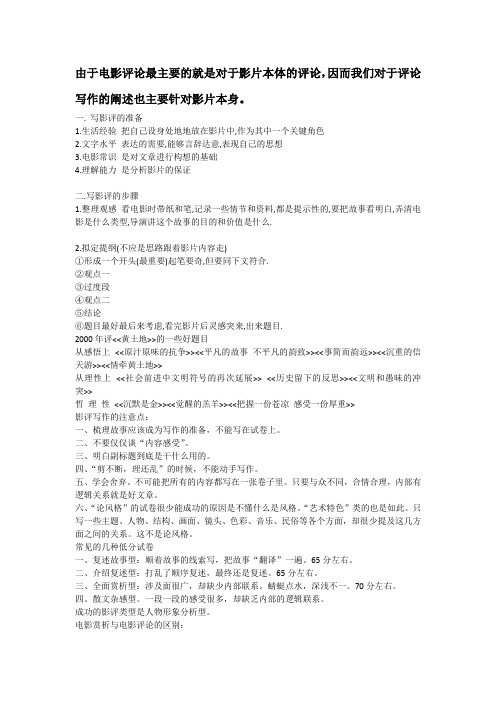
由于电影评论最主要的就是对于影片本体的评论,因而我们对于评论写作的阐述也主要针对影片本身。
一. 写影评的准备1.生活经验把自己设身处地地放在影片中,作为其中一个关键角色2.文字水平表达的需要,能够言辞达意,表现自己的思想3.电影常识是对文章进行构想的基础4.理解能力是分析影片的保证二.写影评的步骤1.整理观感看电影时带纸和笔,记录一些情节和资料,都是提示性的,要把故事看明白,弄清电影是什么类型,导演讲这个故事的目的和价值是什么.2.拟定提纲(不应是思路跟着影片内容走)①形成一个开头(最重要)起笔要奇,但要同下文符合.②观点一③过度段④观点二⑤结论⑥题目最好最后来考虑,看完影片后灵感突来,出来题目.2000年评<<黄土地>>的一些好题目从感悟上<<原汁原味的抗争>><<平凡的故事不平凡的韵致>><<事简而韵远>><<沉重的信天游>><<情牵黄土地>>从理性上<<社会前进中文明符号的再次延展>> <<历史留下的反思>><<文明和愚昧的冲突>>哲理性<<沉默是金>><<觉醒的羔羊>><<把握一份苍凉感受一份厚重>>影评写作的注意点:一、梳理故事应该成为写作的准备,不能写在试卷上。
二、不要仅仅谈“内容感受”。
三、明白副标题到底是干什么用的。
四、“剪不断,理还乱”的时候,不能动手写作。
五、学会舍弃。
不可能把所有的内容都写在一张卷子里。
只要与众不同,合情合理,内部有逻辑关系就是好文章。
六、“论风格”的试卷很少能成功的原因是不懂什么是风格。
“艺术特色”类的也是如此。
只写一些主题、人物、结构、画面、镜头、色彩、音乐、民俗等各个方面,却很少提及这几方面之间的关系。
如何写电影评论(大全5篇)

如何写电影评论(大全5篇)第一篇:如何写电影评论如何写电影评论中学生比较喜欢看电影电视,看了之后也比较喜欢谈论片中的内容,或是写一些对电影看法的文章.但往往容易将影评写成观后感,其实两者是有很大区别的观后感——重在“感”,表达方式以抒情,叙述为主,内容多为电影对观众的启发,观众看了影片后的感想等.影评——重在“评”,在挖掘了主题之后,应当对主题的成功与否,主题的表现所依赖的环境是否真,人物形象的塑造是否符合现实生活以及电影语言的运用是否成功等方面展开评价与论述.写好影视评论的前提是细心观赏.影视评论不同于书评,书可以反复地看,而影片却一闪即逝,因此,在看电影时不能漫不经心,而要全神贯注,眼观六路,耳听八方,对画面,音乐,对白,音响,表演等方面都要体察精细,并及时捕捉闪光的东西.这样在写的时候才能得心应手,运用自如.和其他文艺评论一样,影视评论要解决的主要问题也是“评什么”和“怎么评”.评什么: “事事洞明皆学问,人情练达即文章.”在影片中可评的角度很多.就一部影片而言,可以评主题,评人物,评细节,评场面,评艺术特点,评电影语言的运用等;就多部影片来说,可综合评论一系列影片,阐明某一时期电影艺术创作的倾向和特点;可综合某一类影片(如惊险片,探索片等)进行评论;可综合同一类问题(如古装片的雷同化等)进行评论;另外,还可以进行电影专评,如平添编剧,评导演,评演员,评摄影,评美工,评音乐等.面对这些可评的内容,初学写影评的中学生具体应如何处理呢最好的办法是“集中优势兵力歼灭敌人”,抓住影片中给自己留下印象最为深刻,最能激发自己写作欲望的问题来写,这样便于对问题作深入细致的评论,忌面面俱到.怎么评:① 历史的角度来评价影片主题,人物形象.电影源于生活,是对生活的锤炼和创造.只有真实而又艺术地反映生活,才能在观众的心灵中产生震撼,引起观众的共鸣.社会生活是影片产生的基础,我们在评论影片时,就要将影片放到一定时代的,社会的,民族的生活环境中,去考察影片所反映的社会生活是否真实,深广度如何,有没有表现出深刻的历史感和鲜明的现实感;去考察人物形象是否符合其生活的环境,是否有过分拔高或贬低人物形象的情况.历史的标准是衡量一部影片成功与否的关键尺子.② 美学的标准来评论影片的美感效果.影片是社会审美心理的反映,所以当对具有审美特征的影片进行评价时,不能不考虑美学的角度.艺术形象的真实与否,典型化程度如何,形式是否完美,人物形象的塑造,画面的组合,音乐的配置等是否能够满足观众的审美要求等都要以美学的标准来衡量.如在评论张艺谋前期的一部分作品时,如果不坚持美学的标准,就无法客观地评论影片中所暴露出来的一些偏僻地方的陋习.③ 住细节,诠释其深刻含义.所谓细节,是影片画面中对表现对象的局部或细微的变化进行精要细致的描绘.细节包括人物的举手投足,一颦一笑,道具的运用,色彩的调度,声音的变化等.典型的细节对展现人物性格,设置悬念,推动情节发展都起着积极作用.如《大转折》中先后三次出现蒋介石的背影, 每一次出现都预示着国民党军队下一次的失败,通过三次背影的刻划,将蒋介石政权日薄西山的局面溢于言表地体现出来.④ 影视艺术角度入手来评论影视语言运用的成功与否.所谓影视语言,即导演根据运动,组接规则来调动,联结各类镜头.包括特写,快慢镜头,蒙太奇的组接方式等.影视语言应具有比较完善的信息传递,它不仅要具有画面组合的叙事能力,更应具有揭示客观对象内在涵义的功能.当然,对影片进行评论的角度还有很多,只要能抓住影片的某一方面,准确地进行评论,都能够收到很好的效果.怎么写影评?一、不要写成观后感写好看片分析文章,关键在于能否准确把握文章的体裁。
影评方法(课程复盘如何写影评)
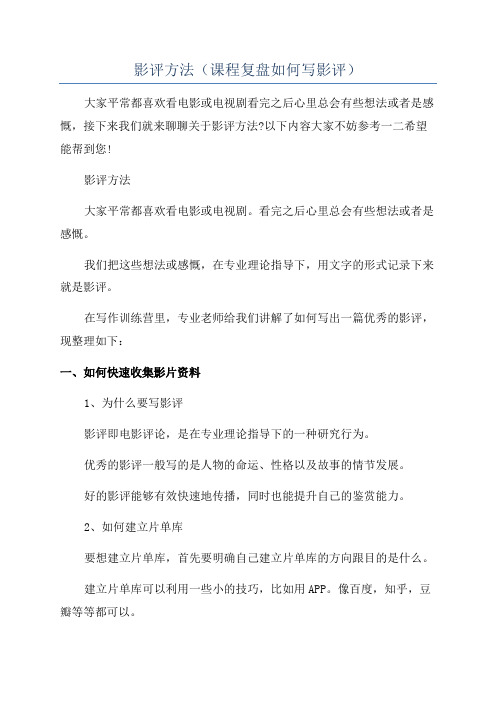
影评方法(课程复盘如何写影评)大家平常都喜欢看电影或电视剧看完之后心里总会有些想法或者是感慨,接下来我们就来聊聊关于影评方法?以下内容大家不妨参考一二希望能帮到您!影评方法大家平常都喜欢看电影或电视剧。
看完之后心里总会有些想法或者是感慨。
我们把这些想法或感慨,在专业理论指导下,用文字的形式记录下来就是影评。
在写作训练营里,专业老师给我们讲解了如何写出一篇优秀的影评,现整理如下:一、如何快速收集影片资料1、为什么要写影评影评即电影评论,是在专业理论指导下的一种研究行为。
优秀的影评一般写的是人物的命运、性格以及故事的情节发展。
好的影评能够有效快速地传播,同时也能提升自己的鉴赏能力。
2、如何建立片单库要想建立片单库,首先要明确自己建立片单库的方向跟目的是什么。
建立片单库可以利用一些小的技巧,比如用APP。
像百度,知乎,豆瓣等等都可以。
3、如何快速搜集相关影评资料可以通过APP你观看的影片的名称。
然后,关于这部影片的所有资料,包括拍摄背景、导演、演员的背景,与影片相关信息都能够呈现在你的面前。
可以根据你的影评内容,有选择的进行引用。
也可以看这部影片的原著,然后加入你的观影体验。
二、如何看待影视剧物件细节安排和情节安排物件细节能够推动电影细节的发展,用物件可以表达人物的相关信息。
这些物件可以是身体的挂件、生活里物件、首饰类物件、挂画、衣服等等。
好的导演在拍摄时能够将物件升华为物件细节,让电影的观感更加丰富,人物表现更加细腻。
2、物件细节具有很高的艺术价值它可以推动情节的发展,让情节完善,有逻辑性,结构缜密。
它还能借物寓言,即借其中一物件表达人物感情纠葛。
它也能够塑造人物性格,有时候通过这些物件细节,你就能够判断出这个人物是一个什么样的脾气秉性。
还有一些物件细节是具有揭示性的关键性物件,它能让故事情节有新的发展或者是意想不到的转折。
3、用物件细节强化冲突有些物件细节能够激化人物之间的矛盾,将情节推向高潮。
三、新手影评公式,帮你快速写出优质影评1、如何起个吸人眼球的标题标题的类型有自媒体的观点文、单行标题、复合标题。
写影评的套路

要点一:掌握写影评套路对于没有系统学过影视理论分析的学生而言,高校不会要求学生有很理论化的阐述,关键是要求真,写出考生的真实感受,最忌讳人云亦云,没有主见。
比如,考生可能在事先复习中看过相关的内容介绍或别人对影片、作品的评论,一味引用别人的想法是得不到高分的。
其次,表达方式要系统。
例如在表达“喜欢”时,要言之有据,列出理由。
避免空泛地讲大道理。
此外,应该尽量从正面角度阐述影片的主题。
建议:掌握一套写影评的套路(以下方法供参考):开头部分,用简短的话将影片的基本内容进行概括;第二部分,写自己的观后感,认为影片的主题思想是什么;第三部分,写影片的艺术风格是什么;最后进行总结。
要注意的是,影片的主题思想应该和艺术风格相统一。
要点二:最忌讳胡编乱造进行命题创作,切忌胡编乱造。
考生应该从联系实际生活,有感而发。
这一环节主要考察三个要素:文字表达能力、构思能力(想象力)和驾驭故事的能力。
要利用设置情节任务、矛盾冲突、渲染和铺垫等技巧展开创作。
考生应尽量从身边的小事写起。
要重点突出故事里面的人物,在人物的情感上下功夫,以情动人。
写文字要具有画面感,即提倡细节描写。
比如,到了一个地方,可以描述一下环境。
写人物时,可以通过他的穿着、打扮、面部表情,来为人物性格服务等。
建议:考生用第1人称来写故事,比较易于把握。
考前一周可以看一些成熟的微型小说,例如《故事会》、《读者》等,形成写故事的概念。
此外,在考试前,还应该有意识的准备2篇写人物的文章。
要点三:看文艺普及读物对于高中生来说,高校不会要求考生在某一点上很深入,但是考生对文艺的知识面必须要广比如,对于某一领域有哪些大师要心中有数。
同时同考试是以客观性基础常识为主,思考性常识为辅。
考生对一些问题要能谈一点感受。
如对现在的诸多选秀类节目怎么看等。
怎样写看片分析看片分析,是先让考生观看一部电视片的录相或光盘,然后按要求写文章。
怎样写好看片分析?不要写成观后感。
写好看片分析文章,关键在于能否准确把握文章的体裁。
写作指导:如何写出一篇有深度的影评

写出一篇有深度的影评需要你具备一定的电影知识和鉴赏能力。
以下是一些指导建议,帮助你写出有深度的影评:1. 选择一部你熟悉的电影:在写影评之前,选择一部你熟悉或者感兴趣的电影。
这将有助于你更深入地理解和分析电影的各个方面。
2. 观看电影:在写影评之前,确保你已经完整地观看了电影。
多次观看电影可以帮助你更全面地理解电影的情节、角色和视觉风格。
3. 分析电影的情节和主题:在影评中,你需要对电影的情节和主题进行深入的分析和探讨。
思考电影的主题是什么,以及它如何通过情节和角色展现出来。
4. 分析电影的视觉风格:电影是一种视觉艺术形式,因此分析电影的视觉风格是写出一篇有深度的影评的关键。
注意电影的摄影、画面布局、色彩和灯光等方面的运用。
5. 分析电影的音效和音乐:电影的音效和音乐对于营造氛围和情感表达非常重要。
在影评中,你可以对电影的音效和音乐进行分析,探讨它们如何增强电影的叙事效果。
6. 引用其他影评或评论:如果你在写影评时引用其他影评或评论,可以提供额外的观点和分析,使你的影评更具说服力。
但要注意避免过度引用,确保自己的观点和分析为主导。
7. 撰写清晰的结论:在影评的结论部分,总结你的观点和分析,并给出对电影的整体评价。
你可以提出自己的见解和建议,以及对未来电影制作和观众的建议。
8. 校对和编辑:在完成影评后,仔细校对和编辑文章,确保语法、拼写和标点符号使用正确。
一篇优秀的影评需要经过多次修改和润色,才能最终呈现出来。
最后,要记住,写出一篇有深度的影评需要时间和精力的投入。
不要急于求成,慢慢地去品味电影,分析它的各个方面,然后将你的观点和分析以清晰、有说服力的方式表达出来。
影评写作技巧简要总结(编导艺考生复习资料)
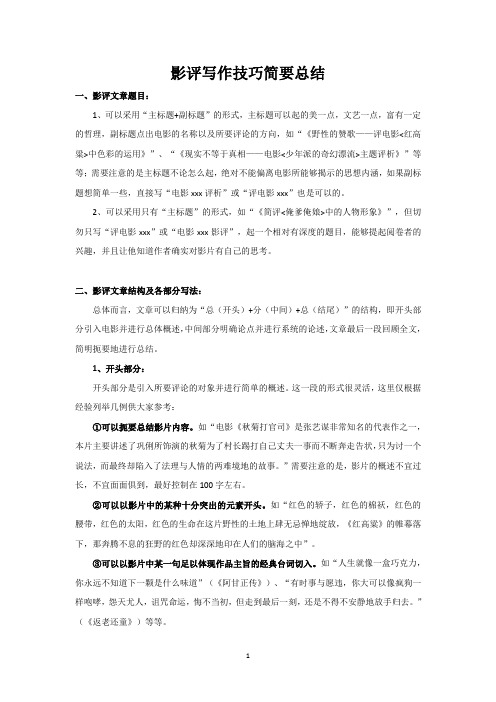
影评写作技巧简要总结一、影评文章题目:1、可以采用“主标题+副标题”的形式,主标题可以起的美一点,文艺一点,富有一定的哲理,副标题点出电影的名称以及所要评论的方向,如“《野性的赞歌——评电影<红高粱>中色彩的运用》”、“《现实不等于真相——电影<少年派的奇幻漂流>主题评析》”等等;需要注意的是主标题不论怎么起,绝对不能偏离电影所能够揭示的思想内涵,如果副标题想简单一些,直接写“电影xxx评析”或“评电影xxx”也是可以的。
2、可以采用只有“主标题”的形式,如“《简评<俺爹俺娘>中的人物形象》”,但切勿只写“评电影xxx”或“电影xxx影评”,起一个相对有深度的题目,能够提起阅卷者的兴趣,并且让他知道作者确实对影片有自己的思考。
二、影评文章结构及各部分写法:总体而言,文章可以归纳为“总(开头)+分(中间)+总(结尾)”的结构,即开头部分引入电影并进行总体概述,中间部分明确论点并进行系统的论述,文章最后一段回顾全文,简明扼要地进行总结。
1、开头部分:开头部分是引入所要评论的对象并进行简单的概述。
这一段的形式很灵活,这里仅根据经验列举几例供大家参考:①可以扼要总结影片内容。
如“电影《秋菊打官司》是张艺谋非常知名的代表作之一,本片主要讲述了巩俐所饰演的秋菊为了村长踢打自己丈夫一事而不断奔走告状,只为讨一个说法,而最终却陷入了法理与人情的两难境地的故事。
”需要注意的是,影片的概述不宜过长,不宜面面俱到,最好控制在100字左右。
②可以以影片中的某种十分突出的元素开头。
如“红色的轿子,红色的棉袄,红色的腰带,红色的太阳,红色的生命在这片野性的土地上肆无忌惮地绽放,《红高粱》的帷幕落下,那奔腾不息的狂野的红色却深深地印在人们的脑海之中”。
③可以以影片中某一句足以体现作品主旨的经典台词切入。
如“人生就像一盒巧克力,你永远不知道下一颗是什么味道”(《阿甘正传》)、“有时事与愿违,你大可以像疯狗一样咆哮,怨天尤人,诅咒命运,悔不当初,但走到最后一刻,还是不得不安静地放手归去。
如何写好电影评论
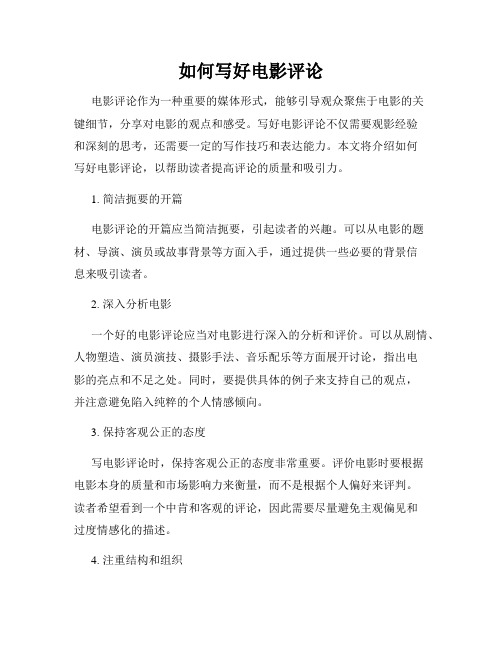
如何写好电影评论电影评论作为一种重要的媒体形式,能够引导观众聚焦于电影的关键细节,分享对电影的观点和感受。
写好电影评论不仅需要观影经验和深刻的思考,还需要一定的写作技巧和表达能力。
本文将介绍如何写好电影评论,以帮助读者提高评论的质量和吸引力。
1. 简洁扼要的开篇电影评论的开篇应当简洁扼要,引起读者的兴趣。
可以从电影的题材、导演、演员或故事背景等方面入手,通过提供一些必要的背景信息来吸引读者。
2. 深入分析电影一个好的电影评论应当对电影进行深入的分析和评价。
可以从剧情、人物塑造、演员演技、摄影手法、音乐配乐等方面展开讨论,指出电影的亮点和不足之处。
同时,要提供具体的例子来支持自己的观点,并注意避免陷入纯粹的个人情感倾向。
3. 保持客观公正的态度写电影评论时,保持客观公正的态度非常重要。
评价电影时要根据电影本身的质量和市场影响力来衡量,而不是根据个人偏好来评判。
读者希望看到一个中肯和客观的评论,因此需要尽量避免主观偏见和过度情感化的描述。
4. 注重结构和组织电影评论需要有清晰的结构和良好的组织,以便读者能够理解和跟随文章的思路。
可以采用标题和段落来划分不同的主题,确保每个段落都有一个明确的论述点,并通过过渡语句来保持段落之间的连贯性。
5. 使用恰当的语言和词汇电影评论的语言应当准确明了,并选择适合的词汇来表达观点。
尽量避免使用过于晦涩的词汇或长句子,以免读者产生困惑。
同时,也要注意使用较为正式的语言风格,以提高评论的专业性。
6. 广泛参考其他评论和观点在写电影评论时,可以广泛参考其他评论和观点,以丰富自己的思考和观点。
通过了解其他评论家的观点,可以帮助自己更全面地理解电影并提供更多角度的评论。
7. 结尾总结和评价电影评论的结尾应当对整个评论进行总结,并给出自己的最终评价。
可以回顾重点和亮点,并给予电影一个综合性的评分或评价。
同时,结尾也可以在引发读者的思考或促使他们去观影方面提供一些建议。
总之,写好电影评论需要提供准确详细的分析和评价,并且保持客观公正的态度。
写影评的步骤范文

写影评的步骤范文影评是对电影、电视剧或其他视听作品进行客观评价和分析的文章。
写一篇好的影评需要经过一系列的步骤,以确保文章内容有逻辑,观点清晰,并能给读者提供准确的信息和细致的分析。
以下是写影评的步骤。
第一步:观看影片并做笔记首先,选择一部你感兴趣的影片或作品,仔细观看,并在观看的过程中做笔记。
这些笔记可以包括你对剧情、角色、表演、导演等方面的第一印象,记录你观看时的感受和想法。
同时,也可以记下一些关键场景、对白或镜头,以备后用。
第二步:研究和分析在观看完影片后,进行进一步的研究和分析。
这可以包括了解导演的背景和作品风格,了解片中使用的技术和它们对故事的影响,以及对影片内容的进一步理解。
你可以参考其他评论家或专家的观点,这将帮助你得到更全面的了解和视角。
第三步:确定文章的结构和主题在开始写作之前,确定你想要表达的主题和文章的结构。
你可以选择按照时间顺序进行剧情介绍,或按照主题和要点进行组织。
主题可以是关于电影的主题,或者是你对电影的整体评价。
结构的选择应该能够使读者能够清晰地了解你的观点和分析。
第四步:撰写引人入胜的开头开头是吸引读者的重要一环。
你可以使用有趣的事实或引用,来吸引读者的注意力。
同时,你也可以简要介绍下电影的背景或基本情节,以便读者对文章有所了解。
第五步:详细描述和分析之后,进入详细的描述和分析部分。
你可以按照你的结构安排,依次介绍电影的不同方面。
注意确保你的论据有逻辑性,并提供充足的证据来支持你的观点。
你可以引用片中的对白或镜头,对角色塑造、剧情发展、情感走向或视觉效果等方面进行分析和解读。
第六步:评价和总结在分析部分之后,对电影进行总体评价。
你可以提出你认为该电影的优点和缺点,针对你的主题进行评价,或者表达你对其的情感态度。
评价内容应该与你之前的观点和分析相吻合,并且要明确、有力地表达你的意见。
第七步:检查和修改完成第一稿后,进行检查和修改。
检查语法、拼写和标点错误,并确保表达清晰、流畅。
写作技巧如何撰写引人入胜的电影评论
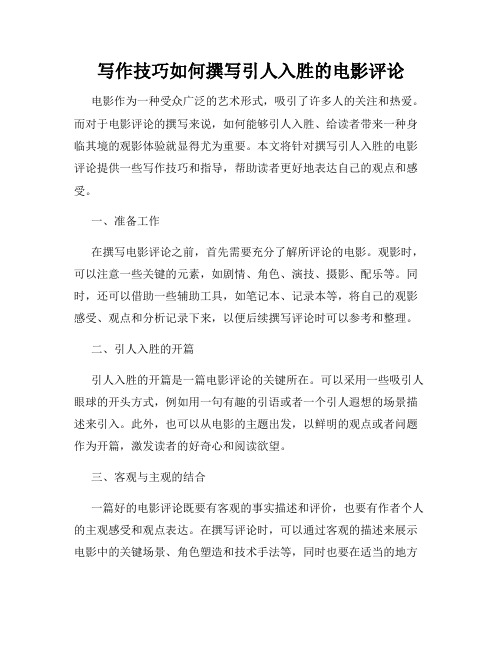
写作技巧如何撰写引人入胜的电影评论电影作为一种受众广泛的艺术形式,吸引了许多人的关注和热爱。
而对于电影评论的撰写来说,如何能够引人入胜、给读者带来一种身临其境的观影体验就显得尤为重要。
本文将针对撰写引人入胜的电影评论提供一些写作技巧和指导,帮助读者更好地表达自己的观点和感受。
一、准备工作在撰写电影评论之前,首先需要充分了解所评论的电影。
观影时,可以注意一些关键的元素,如剧情、角色、演技、摄影、配乐等。
同时,还可以借助一些辅助工具,如笔记本、记录本等,将自己的观影感受、观点和分析记录下来,以便后续撰写评论时可以参考和整理。
二、引人入胜的开篇引人入胜的开篇是一篇电影评论的关键所在。
可以采用一些吸引人眼球的开头方式,例如用一句有趣的引语或者一个引人遐想的场景描述来引入。
此外,也可以从电影的主题出发,以鲜明的观点或者问题作为开篇,激发读者的好奇心和阅读欲望。
三、客观与主观的结合一篇好的电影评论既要有客观的事实描述和评价,也要有作者个人的主观感受和观点表达。
在撰写评论时,可以通过客观的描述来展示电影中的关键场景、角色塑造和技术手法等,同时也要在适当的地方融入个人的主观感受和情感表达,让读者能够更好地感受到电影所带来的触动和情绪。
四、结构清晰的篇章逻辑为了让读者容易理解,一篇电影评论应该具有清晰的篇章结构和逻辑。
可以将观影感受和观点分为不同的段落,以呈现一种由表及里、由近及远的层层推进。
使用过渡词汇和句子,如“首先”、“其次”、“然而”等,将不同的观点和段落有机地连接起来,使整个文章的结构更为清晰和有条理。
五、生动形象的语言运用在撰写电影评论时,要尽量运用生动形象的语言,让读者能够更好地想象和感受到电影中的画面和情节。
可以使用具体的描述词语和形象的比喻、对比来传达作者所感受到的电影魅力和独特之处。
同时,也要避免使用过于冗长和晦涩的语句,保持语言简洁明了,让读者能够轻松地理解和阅读。
六、深入思考的观点阐述除了对电影的表面描述和评价之外,一篇引人入胜的电影评论还需要深入思考和观点的阐述。
如何写一篇优秀的影评

如何写一篇优秀的影评最近在花时间研究如何提高写作能力。
原因很简单,现实来说就是可以通过写文章提高自己的朋友圈逼格,当你的朋友们只是无聊地发出“啊,好美(幸福,开心,刺激,伤心...)”这样简单的感叹时,你可以洋洋洒洒地写出2000字的短评,渐渐地你就会发现同样生活在一个环境里,你比他们看到的东西更多,你的阅历甚至都会因此变得更丰富。
当然,我现在还没有这样的成就,我只是走在通往“文笔自由【自创的一个词,意思就是当你想表达自己的想法时,不会欲言又止,不会词穷】”的路上不断努力而已。
以下是本人结合《怎样讲一个好故事》(中国文史出版社)的其中一篇,《为讲故事而做的采访:10个窍门》,给出的一点触类旁通的建议,关于如何利用文章给出的建议去写一篇尚可的影评。
0.为什么写影评看过很多文章介绍如何练习写作,遍观之后我发现多数方法都建立在一个基础上,为了练习写作而写作。
不可否认,熟能生巧确实是一个说得过去的理由,不管什么方法,实际上只要你能坚持下来,能够坚持每天完成一定量的原创练习,一段时间之后总能够看到成效。
不过作为一个非专业的写手,我们的目的性其实并没有这么强,就像我上面说的,写作的很大一部分目的就是能够丰富自己的生活,提高自己的所谓逼格而已。
如此强迫自己做一些不感兴趣的事情,往往事倍功半,很难坚持下来的。
而我发现,写影评其实是一个比较容易坚持下来的练习方法。
原因有:1.电影素材多,不会找不到话题。
甚至有的时候你可以给自己定一个话题,找若干部电影横向比较着看,理解更深入,灵感也更多。
2.参看其他的影评可以在同样的题目下跟其他创作者做横向对比,取彼之长。
比如豆瓣,就是一个优秀影评集中的地方,如果你写的影评可以在上面收货同道中人的赞同,同时也会极大地提高自己的自信心。
3.轻松愉快,不勉强。
看电影当然舒服,但是不要忘了我们是带着目的来的,所以在看的过程中,需要做一定量的笔记,带着思考去欣赏作品。
通常这不仅不会影响你的观影体验,反而会让你看得更深入,收获更多。
作文:怎样写影评

怎样写影评写影评就是把看完电影后的感受用文字记录下来。
一部影片可以谈论的东西很多,但应该谈论的是那感动自己的部分。
一、影评写作的角度二、影评写作要求影评写作的角度——思想评论:1.评主题。
力求有独到见解,深入挖掘。
2.评现实意义。
也与主题有关,但更侧重于现实作用,现实题材的3.写。
要联系现实,融进自我,或是褒扬先进,批语落后,针贬时弊;或是进行自我观照,寻找差距,激励鞭策。
要注意的是不能写成“故事简介+自我对照”,二是要紧扣影片,而不是从影片中抽出一个话题,离开对影片的评论。
人物评论。
在人物评论写作中,最好力求不仅评析人物形象的意义,而且要结合人物塑造的方法,把握人物独有的个性,如人物特有的行为、动作、理想、志趣、才干,从中更深地挖掘出人物形象意义,美学评论(样式、风格、审美特性等)1.艺术样式评论。
2.艺术风格评论。
3.审美特性评论。
影评写作要求一、紧扣“电影”与“评论”。
所评论的内容必须是影片提供的,而不能从说明书和报刊故事中寻找。
要抓住电影艺术的特质,评论的对象有画面感、运动感。
让没有看过电影的人也能获得对影片的大致了解,认同你的观点。
要展开评论,明确中心,严密地进行说理与论证。
二、总体把握,细部突破。
首先对一部影片有正确的总体评价,在此基础选择一个较小的视角深入挖掘,做到高屋建瓴,品鉴入微。
避免面面俱到,人云亦云。
另一方面避免一叶障目,不见树林。
力求写出鞭辟入里的专论,不要写泛论、散论。
陷入“故事情节+主题思想+艺术特色+演员介绍+拍摄花絮”公式。
三、思想性与艺术性的统一。
侧重于社会意义的评论要注意兼顾影片的艺术性,要用影片提供的银幕形象进行说明与论证。
侧重于艺术价值的评论要把握艺术表现中体现的思想内涵。
要讲究评论文章自身的艺术性。
四、注重思辩、讲究文采。
力求有自己独到的见解,力求新颖、深刻。
注意评论语言的生动活泼、形象鲜明,注意句式长短得当、音韵和谐,既要有理论色彩,又要明白晓畅,让理论文章给人语言美感与动情力量。
- 1、下载文档前请自行甄别文档内容的完整性,平台不提供额外的编辑、内容补充、找答案等附加服务。
- 2、"仅部分预览"的文档,不可在线预览部分如存在完整性等问题,可反馈申请退款(可完整预览的文档不适用该条件!)。
- 3、如文档侵犯您的权益,请联系客服反馈,我们会尽快为您处理(人工客服工作时间:9:00-18:30)。
精华整理:写精彩影评和书评攻略
一
一篇电影或者书籍评论,起码要求:
1、讲讲是什么内容,读者需要概括的介绍性文字。
2、点评一下优劣,好在哪里,不足在哪里。
3、比较一下类似作品,做纵向或者横向的比较,帮助读者理解和欣赏。
4、相关背景资料介绍,提供大信息量。
相对应的,需要个人:
1、基本的阅读理解和表达概括能力。
把一本书和一部电影压缩到一段话里说清楚。
2、个人一贯的审美体系。
好坏都是相对概念,所以个人坚持的理论体系很重要,它是基本评价标准,而任何一种体系都会有同道中人。
3、足够的阅读量和观影量。
4、平常的资料搜集和积累。
但是,文章精彩与否,和文气有关。
质料都是死的,文章需要精神气才能立得住。
精神气又和情怀有关,打动读者的永远不是文字,而是文字后面流露出来的作者的情怀。
二
1. 尝试去了解作者想做到的事,不要对他根本没打算做到的横加指责。
2. 提供足够的原文引用,至少有一段原文,由此读者可以形成自己的看法,可以得到自己的切身体验。
3. 通过引用原文来证明你对本书的描述是正确的,哪怕只有一个词组,也比模糊的大意强。
4. 简述情节的时候尽量笼统,也不要剧透(曾经天真的我,发现书评人剧透,和类似崇高的国王酒后描述农民起义那般的不准确,何其震惊和气愤,两者都导致了我的推理性思考和惊喜的丧失大半!最讽刺的是,作者期待的没有遭受剧透的处女读者,是可恶的书评人。
继而,多年以后,是那个随机从图书馆架子上抽出该书的傻瓜,上帝保佑他。
)
5. 如果认为这本书有问题,从该作者的或其他作者的同类作品中举一个成功的例子。
试图理解这个失败。
你肯定是他错了,而不是你错了?
三
写影评三大原则:
1、第一原则:不是为写而写。
影评、书评、乐评和其他类似于观后感的文章都是一个性质,那就是最好是有感而发。
在欣赏过一些触动灵魂的艺术作品后,正常人会有强烈的想与人分享的欲望,以期获得共鸣的满足。
这个时候如果能将这种感觉用文字还原出来,传播给更多的人,无疑是最有效的方式。
所以如果你单纯是为了写而写,比如说国内一些收红包的枪手或者以此为业的人,尤其是后者,很多时候就会很痛苦,因为面对一些垃圾只会想唾弃,但是因为有利益关系无法完全独立所以不能从心所欲。
于是写出来的东西也很容易变味,失去它真正的价值所在。
2、第二原则:遵循写作技巧及规律
影评的写作当然也得遵从文章创作技巧,跟拍商业电影有异曲同工之处,例如一开始就得大概策划好你要表达的主题是什么,有什么内容可以支持它;在哪个地方需要埋些伏笔,在结尾处如何点题或者和标题呼应;是采取倒叙还是平铺直叙,是和同类电影做一个类比还是和不同电影做对比。
总之,最好不要意识流形式的想到哪写到哪,毕竟评论是介绍一部电影,基本的逻辑和条理性不满足很难让人读得下去,更不要说因此而产生看电影的欲望或者是看完电影之后通过阅读影评产生快感了。
3、第三原则:以一定的看片量为基础
要做到言之有物,就必须有足够的知识储备。
我大概是小学开始看电影的吧,经历过录像厅时代,VCD时代,DVD时代到现在的蓝光时代,到目前为止看片量没有做过最终统计,但是超2000部肯定是没有问题的。
我到大一下半学期的时候第一次开始写影评,第一篇是盗火线。
起因是那会混迹电影论坛,看别人评电影觉得自己也有很多话想说,于是开始着手。
当时刚经历过高考还不到两年,当时语文老师对我的作文水平中规中矩无甚亮点的评价还历历在目。
但是我全凭感觉写出的影评竟然在论坛上得到了大家的好评。
于是一发不可收拾。
大学是我创作的高峰期,很多文章得到发表,我也因此认识了一大批志同道合的朋友。
虽然最后仍然转向了法律但是这个爱好我还是保留至今的。
所以,如果你拥有了足够的看片量,你自然会有想表达的欲望,这其实是自然而然的事情。
四
厄普代克关于如何写书评的六条「金科玉律」
1. Try to understand what the author wished to do, and do not
blame him for not achieving what he did not attempt.
2. Give him enough direct quotation—at least one extended
passage—of the book’s prose so the review’s reader can form
his own impression, can get his own taste.
3. Confirm your description of the book with quotation from
the book, if only phrase-long, rather than proceeding by
fuzzy precis.
4. Go easy on plot summary, and do not give away the ending.
(How astounded and indignant was I, when innocent, to find
reviewers blabbing, and with the sublime inaccuracy of
drunken lords reporting on a peasants’ revolt, all the turns
of my suspenseful and surpriseful narrative! Most ironically, the only readers who approach a book as the author intends,
unpolluted by pre-knowledge of the plot, are the detested
reviewers themselves. And then, years later, the blessed fool
who picks the volume at random from a library shelf.)
5. If the book is judged deficient, cite a successful example
along the same lines, from the author’s ouevre or elsewhere.
Try to understand the failure. Sure it’s his and not yours?
To these concrete five might be added a vaguer sixth, having
to do with maintaining a chemical purity in the reaction
between product and appraiser. Do not accept for review a book
you are predisposed to dislike, or committed by friendship
to like. Do not imagine yourself a caretaker of any tradition,
an enforcer of any party standards, a warrior in an
idealogical battle, a corrections officer of any kind. Never,
never (John Aldridge, Norman Podhoretz) try to put the author
“in his place,” making him a pawn in a contest with other
reviewers. Review the book, not the reputation. Submit to
whatever spell, weak or strong, is being cast. Better to
praise and share than blame and ban. The communion between
reviewer and his public is based upon the presumption of
certain possible joys in reading, and all our discriminations
should curve toward that end.
大致意思是:
1. 尽量去理解作者想写出什么,同时也不要责备他没能写出他根本就不想去写的。
2. 给出足够的原文引用——至少较长的一段,这样读者看到此文就会产生他自己的印象,获得他自己口味。
3. 评论够短的话,请直接引用原文,不要给一些模糊不清的结论。
4. 主要部分的评论,慢慢来,不要言辞激烈而愚蠢,别丢掉了结尾部分。
5. 对差评,看看那部分中写得好的地方,试图去理解为什么没写好。
搞清楚那是他的失败,还是你自己的评论不对。
6. 绝对客观和中立。
